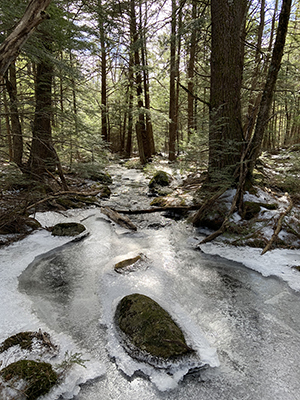A unique conservation forestry program that could be a game-changer for New England’s private forest owners is growing with the recent donation of an 88-acre land parcel and its timber in Royalston, Mass. The New England Forestry Foundation’s Pooled Timber Income Fund (PTIF) received its first donation in late May from Richard and Cynthia Perkins, and through the PTIF, the Perkins will now receive lifetime income while ensuring permanent protection for and responsible management of their forest.
“We’re excited to welcome Richard and Cynthia Perkins to the Pooled Timber Income Fund, and feel honored they’ve entrusted us with their Royalston woodland, which is adjacent to an important wildlife corridor,” said Frank Lowenstein, chief operating officer of the New England Forestry Foundation. “Between the Perkins gift and existing enrollments from non-profit organizations via long-term lease the Pooled Timber Income Fund is growing in scale and conservation impact. We welcome other landowners to consider this tool as part of their long-term plans for their forestland.”
Richard Perkins, who is a founder of LandVest and an outgoing member of the New England Forestry Foundation Board of Directors, is pleased to be part of what he calls, “a very good and innovative project.”
“I think the idea of pairing a steady flow of income with a conservation gift is appealing to people who wouldn’t otherwise feel they could donate their land,” Perkins said. “The Pooled Timber Income Fund is a unique addition to the land conservation toolbox, and provides new reasons for people to want to protect their woodlands.”
PTIF participants donate their woodlands to the New England Forestry Foundation, and the woodlands’ timber is contributed to a pooled income fund trust. In turn, donors receive a stream of lifetime income and an initial charitable tax deduction. On the death of the beneficiaries designated at the time of the donation, the timber reverts to the New England Forestry Foundation. The land becomes part of the New England Forestry Foundation’s network of more than 150 Community Forests.
“When fund participants donate their land to us, they are guaranteed the gold standard of sustainable forest management, or what we call Exemplary Forestry,” said Lowenstein. “It balances income generation with the long-term health of forests and the many benefits healthy forests provide, from wildlife habitat to helping protect our climate by keeping excess carbon dioxide out of the atmosphere.”

Perkins Woodlands. Photo by Sarah Wells, courtesy of Mount Grace Land Conservation Trust.
Perkins Woodlands—the official new name of the donated property—is bisected by Stockwell Brook, and is nestled between Guiney Memorial Forest, Otter River State Forest, and the Birch Hill Dam. It will receive additional protection from the property’s conservation restriction, which Richard and Cynthia Perkins donated to Mount Grace Land Conservation Trust, a nonprofit that protects significant agricultural, natural and scenic lands and encourages land stewardship in northern and central Massachusetts. Mount Grace has owned the neighboring Guiney Memorial Forest since 1998.
“We are proud to partner with New England Forestry Foundation to protect Perkins Woodlands and grateful to Mr. Perkins for his generosity and commitment to conservation,” stated Mount Grace Conservation Director Sarah Wells.
Landowners and local land trusts haven’t been the New England Forestry Foundation’s only partners in the PTIF. To help establish the program, the New England Forestry Foundation leased timber from two Nature Conservancy preserves in Massachusetts for inclusion in the PTIF. The Bartholomew Farm and McElwain-Olsen Preserves—which were conserved for their ecological values, including limestone ledges and an important cold-water stream—include almost 300 acres of forest land, and managing them to Exemplary Forestry standards provides an opportunity to demonstrate how conservation and good forestry can work hand in hand. The Nature Conservancy (TNC) will exclusively use its PTIF income to further the organization’s land conservation and stewardship work.
“Forests clean our water, remove carbon and other pollution from our air, and help keep us mentally and physically healthy,” said Laura Marx, forest ecologist for TNC in Massachusetts. “Realizing these benefits requires both protecting forests from development—land protection—and managing them well. We’re happy to be a part of the Pooled Timber Income Fund, which helps landowners to do both.”
Land trusts also have the opportunity to lease timber into the PTIF for a set number of years—typically 30—and receive the same financial and conservation benefits as individual landowners, while retaining ownership and recreational management of their property.
Learn more about participating by visiting NEFF’s Pooled Timber Income Fund webpage, or by contacting New England Forestry Foundation conservation project manager Sophie Anthony at 978-952-6856 x122 or santhony@newenglandforestry.org.
Top photo: Perkins Woodlands. Photo by Sarah Wells, courtesy of Mount Grace Land Conservation Trust.
